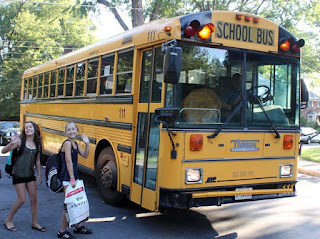Keeping Your Kids Safe at School
By Diane Tait
 |
| Image courtesy flickr |
With another school year rapidly approaching for children
in Florida, I thought I’d take the time to address school safety. There doesn’t seem to be a month when parents
aren’t regaled with news of school shootings, bullying on and off the
playground, or strangers approaching children on their way to or from
school. While these episodes seem rampant
due to the fact that the media hypes them no matter where or when they occur,
nonetheless today’s parents have to deal with more than a bit of anxiety about
their kids than my parents ever did. If
you start wringing your hands the moment your child heads for the bus stop
every morning, here are a few tips to help keep them safe.
1. How safe is your child’s school? – While you have no doubt visited your child’s school
during a parent-teacher conference, do you know how safe it is or the
neighborhood in which it resides? The
Internet has several resources that can provide you with crime statistics on
any neighborhood. CrimeMapping and CrimeReports can not
only tell you what kinds of crimes have occurred in the area where your child’s
school is located, it can also show you if any registered sex offenders live nearby.
 |
| Image courtesy USAF |
3. Bully on board. – Every kid who has ever attended school has had
to deal with a bully from time to time.
The difference between bullies today as opposed to those that most
parents are familiar has to do with the fact that kids can now be bullied
online as well as in the schoolyard. The
biggest problem with bullying is that many kids are afraid to tell their
parents about it. The second problem is even
if they do, many parents are unsure of what to do about the bullying. Should they confront the bully or the bully’s
parents? The answer is no. If your child is being bullied at school, the
best course of action is to talk to the teacher or school principal first. Write down the details of the incidents so
you can present the evidence to school officials. Above all, make sure you meet with officials calmly. While seeing your child bullied is sure to
make you angry, the only way to get it to stop is to stay cool, calm and
collected.
4. Cyberbullying – Just as with physical bullying, the best way to
deal with cyberbullying is by proxy.
Resist the urge for you or your child to respond directly online. This will only give the cyberbully satisfaction
and it could result in an escalation of the attack. The best way to stop a cyberbully is to save
every inflammatory remark along with their screenname or email address. Instead of responding in kind, the quickest
way to stop a cyberbully in his or her tracks is to first block the bully, then
to tell the service provider the situation.
This will usually result in the bully being kicked off the service. If this doesn’t stop the abuse, feel free to
turn the evidence over to school officials or even law enforcement, since
cyberbullying is sometimes considered a crime.
 |
| Image courtesy Vimeo |
5. When was the last time you talked to
your child’s teacher? – While
parent-teacher conferences are a great way to learn more about your child as
well as the school they attend, if it’s been more than 6-months since you met
with a teacher, you shouldn’t wait for an invitation. Call the school to make an appointment to see
the teacher as opposed to waiting for the teacher to contact you. During the
meeting, ask not only about how your child is doing scholastically, also take
the time to inquire about who your child’s school friends are and how your
child gets along with classmates.
Believe it or not, teachers know more about the kids in their care than
most parents realize.
6. How is life on the home front? – Another area that has a direct bearing on how
well kids do at school has to do with their home life. If everything is rosy at home, that means
your child has a better than even chance of doing well in school. However, if you are recently divorced, or are
having financial troubles, this can quickly affect your child’s attitude at
school. Children will often take out
their frustrations by acting out in the classroom or neglecting their
studies. This stress can also make it
more likely that they will get in fights either during or after class. If you’re going through a rough patch at
home, by all means tell your child’s teacher about it. Many schools have counselors who can help
your kids deal with stressful domestic situations.
7. How well do you communicate with your
kids? – One of the best ways to help keep your children safe and
secure is to let them know they can tell you anything. The problem with parent/child communication
is that it tends to get less effective the older your kids get. While grade schoolers are generally receptive
to speaking openly with parents, teenagers can become closemouthed due to
everything from peer pressure to hormones.
If you feel you can no longer communicate openly and honestly with your
children, the two alternatives are therapy or communication by proxy. By that, I mean that if you know a family
friend or relative that your child knows and respects, you should see if you
can get them to address your concerns with your child if you can’t.
Diane Tait
owns and operates A&B Insurance. To find out more about how you can save
money on home owner’s insurance, go to her site or fill out the form at right.


I'm glad my son is grown up, school safety is a little scary today.
ReplyDelete